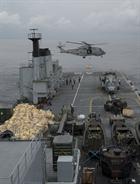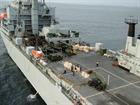820 NAVAL AIR SQUADRON’S MISSION CONTINUES
More than 16,000 people inSierra Leonehave food for a month thanks to a three-day mission byBritain’s Armed Forces to islands cut off from the rest of the country by the Ebola outbreak.
Royal Navy helicopters and Royal Marines landing craft delivered 220 tonnes of food for the United Nations to remote and isolated communities on a chain of islands 60 miles south of the capitalFreetown.
With food supplies beginning to run low as islanders were unable to trade with the mainland, the United Nation’s World Health Programme asked theUKmilitary for help – making use of support ship RFA Argus, her Merlin helicopters and an assortment of Royal Marines craft.
Military personnel carried sacks ashore to coastal communities in theTurtleIslandsand neighbouringSherbroIsland, while the helicopters delivered more than 150 tonnes of food inland, where the ground crew personnel set up makeshift drop sites.
Leading Airman Dave Jackson of 820 Naval Air Squadron helped co-ordinate efforts by the local populace to stockpile the aid delivered toYeleIslandand thevillageofTissana, ensuring that it was protected from the elements in schoolhouses.
“These couple of days were the best and the most rewarding that I’ve had in the Royal Navy,” he said. “It was a fantastic experience to be able to work side by side with the people who will benefit from this aid. Storing it centrally will allow the food to be distributed to those who need it.”
The three helicopters clocked up 42 flying hours as part of the aid mission – codenamed Operation Herring – delivering 314 half-tonne sacks of food, each one containing enough food to support eight households for four weeks.
Mark Warne-Smith, civilian-military liaison officer for the World Food Programme, said the island mission had been “very successful”.
He continued: “We’ve all appreciated the warm welcome – at every island there was a large crowd of enthusiastic people to help lift the food ashore and a lot of smiles from the locals. These islands have not been able to trade with the mainland – normally they would take their fish to market and bring food back. Because they’ve been isolated, the islands have been suffering from a lack of food.”
Mark said he had been struck by “the incredible level of co-operation and goodwill” shown byBritain’s military personnel in helping the UN programme.
This is the second time on Operation Gritrock – the name for the overarching British military effort to stem the tide of Ebola in Sierra Leone – has supported the World Food Programme’s efforts. Last month 820 NAS flew aid into an inaccessible community in the heart ofSierra Leone, achieving in two days something which would have taken a couple of weeks using vehicles on the ground.
The helicopters are using RFA Argus as a floating airfield. The Support Ship, which sailed fromFalmouthin mid October, also carries a team of medics from all three Services, two landing craft and five Royal Marines small boats.
“The sheer effort, enthusiasm and overall commitment to this mission have been absolutely outstanding,” said Commander Ross Spooner 820 NAS Commanding Officer. “To have swiftly – yet safely – transferred 314 bags of aid ashore to a number of locations across the island in only 48 hours, is testament to the flexibility and capability of the Merlin Mk2 and in particular the skill and dedication of my personnel. The whole team should be justifiably proud of what they have achieved.”






